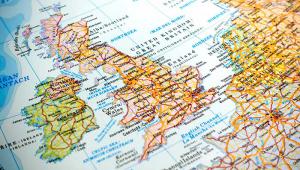By Richard Johnstone | 4 June 2014
Spending cuts or tax increases would be needed in an independent Scotland to meet the estimated £1.2bn cost of policies in the Scottish Government’s independence white paper, the Institute for Fiscal Studies has said.

Image credit| Photos BrianScantlebury, Shutterstock
In its latest analysis of the economics of independence, the think-tank said new calculations – based on forecasts from the Office for Budget Responsibility – suggested an independent Scotland would face a budget deficit of 5.5% of gross domestic product (£8.6bn in today’s terms) in its first year of independence. This is also based on inheritance of a share of the UK’s national debt based on population.
This would not be sustainable for any prolonged period, the IFS stated, and while additional oil revenues could help close this gap, recent evidence also demonstrated this revenue could be lower than expected.
The Scottish Government’s white paper on independence, published last November, rightly identified the UK tax system as overly complex and inefficient, the think-tank said.
However, it only outlined specific tax-raising measures and spending cuts to save £500m a year, as well as an aspiration to raise a further £235m through unspecified measures to remove exemptions and reduce tax avoidance.
The spending increases and tax cuts described in the white paper ‘are more numerous and more costly’, the IFS stated, with plans including the expansion of childcare provision and halting the planned state pension age increase likely to cost £1.2bn a year in the short term. This could increase considerably if aspirations were met in the full, although some policies may have dynamic effects that mean they partly pay for themselves – such as the childcare policy freeing up more people to work, increasing tax revenue.
Delaying the state pension age increase from 66 to 67 due to take effect between 2026 and 2028 would increase spending on the state pension and other benefits by around £550m a year, while the biggest long-term increase in spending is the proposed extension of childcare. This will cost around £100m in the first year, but could rise to as much as £1.2bn if longer-term aspirations are met.
Although some of the costs could be offset by an increase in the number of workers, the institute said there was ‘surprisingly little strong evidence of childcare provision having a big effect on parental labour supply’.
IFS senior research economist David Phillips, one of the authors of the report, said the Scottish Government, as well as the UK government and opposition, were all lacking in detail on how to close the government deficit beyond April 2016.
‘Our calculations suggest that an independent Scotland could expect to be running a deficit of around 5% of GDP in 2016/17, which would be larger than that facing the UK as a whole, and would necessitate tax rises or spending cuts.
‘While the white paper contains some measures that could help balance the books, the spending increases and tax cuts pledged or hinted at are substantially larger. In a difficult fiscal context, such giveaways make the job of restoring the public finances to health more difficult, and would require bigger spending cuts or tax rises in other areas.
'Thus, underlying the seemingly attractive policies outlined in the white paper are difficult, unmentioned, decisions for other public services, benefits and taxes.’
The two reports –Policies for an independent Scotland? Putting the Independence white paper in its fiscal context and Taxation, government spending and the public finances of Scotland: updating the medium term outlook – were published today.
Responding to the reports, a Scottish Government spokesman said: ‘An independent Scotland’s finances in 2016/17 will be similar to, or stronger than, both the UK and the G7 industrialised countries as a whole, and even on the IFS’s projections, Scotland’s public finance balance sheet in the first year of independence will be healthier than the UK’s was in the most recent financial year.
‘However, the IFS’s forecasts of Scotland’s public finances to 2018/19 are based on the OBR’s projections for North Sea revenue which assume that oil production remains static and that prices fall in the coming years. This is despite recent record levels of investment in the industry which analysis by Oil and Gas UK suggests will feed through to higher production in future years.
‘And as the IFS report notes, Scottish taxpayers paid £789 more per head than the UK in 2012/13, demonstrating the huge contribution that Scottish taxpayers make to the UK economy – with more tax per head paid by Scotland than the rest of the UK for every one of the last 33 years.’




















